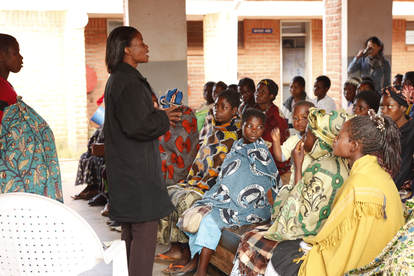PITC Health Talk
|
Health talks are 20- to 30-minute patient education sessions, usually presented by a CHW or HDA while a group of patients is waiting to see a clinician or nurse. A health talk can be a great opportunity to educate patients on the benefits of HIV testing, discuss the HIV services available at the facility and dispel any common myths and misconceptions about HIV testing. This case study outlines guidelines for presenting a health talk and includes a sample script.
Guidelines for Presenting a Health Talk
and to check for audience understanding. |
Activities
|
|
Example Script for a PITC Health Talk
Key Talking Points 1. Why should you get an HIV test when you visit the health facility?
|
3. Patients have a right to confidentiality and this is a priority for counselors
|

